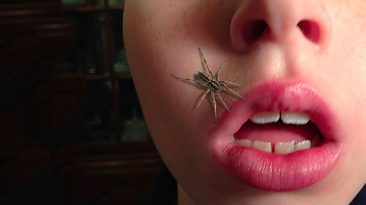Before you cannonball into that refreshing pool, look before you leap. It could just be filled to the brim with blood-sucking lampreys. And they’re hungry. How would they feed on you? How could you get them off you once they latched on? And how long until you’d die?
At first glance, you could mistake this slender, scale-less fish for an eel. But the lamprey has a distinctive funnel-like mouth with teeth that dig into the flesh of other fish to suck out blood and other bodily fluids. Some of the 31 different species of lamprey found in fresh and saltwater start off their lives as filter feeders.
That means they get their meals from particles filtered out of the water around them. Then, they transition into their adult role as carnivorous parasites. They prey on large marine fish. Even sharks. So you’re out of luck. These lampreys are hungry for your blood. As you plunged into the water, your first impression of the lampreys could be that they’re beautiful.
The way their spotted black and blue colors fade to lighter shades on their belly. And their smooth, scale-less skin looks so soft to touch. As you plunged into the water, your first impression of the lampreys could be that they’re beautiful. The way their spotted black and blue colors fade to lighter shades on their belly. With no scales, their smooth skin looks so soft to touch.
The next thing you’d see would be straight out of a nightmare. Mouths filled with 11 or 12 concentric circles of small, sharp teeth would be headed right toward you. Plus, a tongue with the rough texture of sandpaper. You wouldn’t be able to swim away fast enough. Their suction-cup mouths would latch onto different parts of your body. And their grip on you would be tight.
Almost like several little vacuum tubes. Except with teeth. These little fangs would puncture your skin and the lampreys would start to suck out your blood. Just like mosquitoes, an anticoagulant in their saliva would make sure to prevent your blood from clotting while they feed. You wouldn’t be able to just pull them off your body. Their sharp teeth would grind into your flesh.
Give them enough time and they could munch their way straight through to your bones. At this point, you’d start to panic. More than 85% of fish attacked by sea lampreys die from blood loss or infection. With around 5 L (1.3 gal) of blood in your body, you’d manage to survive if only a few attach themselves to you. But in this nearly inescapable hell pool, there would be hundreds of lampreys.
If 90 of them latched onto you for 24 hours, you’d lose enough blood to die. That is if you didn’t drown first. That should be motivation enough for you to pull yourself out of the water with all your strength. With several still suctioned on, I wouldn’t recommend just ripping them straight off. You’d end up tearing chunks of flesh off your body.
Instead, use fire to scare the lampreys off your skin. No matches? You could try to wait them out since lampreys suffocate outside of water. Surviving this lamprey attack wouldn’t be all fun and games. You’d find gaping circular wounds all over your body. And they’d be itchy. That’s thanks to the histamine your body would release in reaction to the anticoagulant in the lamprey’s saliva.
But don’t let all that fresh fish go to waste. The lampreys may look hideous to you now, but many people enjoy them as a delicacy. Throw a little dinner party and serve your friends some lamprey pâté with raw rhubarb. Or lamprey stewed for a few days in its own blood. Yum. Despite your injuries, be grateful that you didn’t fall into a pool filled with something even more disgusting. Like hagfish.
Sources
- “Do Lampreys Attack Humans?”. 2021. owlcation.com.
- “Detection Of Heparin In The Salivary Gland And Midgut Of Aedes Togoi”. Ha, Young-Ran, So-Ra Oh, Eun-Seok Seo, Bo-Heum Kim, Dong-Kyu Lee, and Sang-Joon Lee. 2014. The Korean Journal Of Parasitology 52 (2): 183-188. doi:10.3347/kjp.2014.52.2.183.
- “Sea Lamprey Biology – NYS Dept. Of Environmental Conservation”. 2022. dec.ny.gov.
- “Green Moray Eel”. 2022. oceana.org.
- “Lamprey Vs. Shark Seen Off Rhode Island In Rare Observation”. Melissa Cristina Márquez. 2020. forbes.com.


















